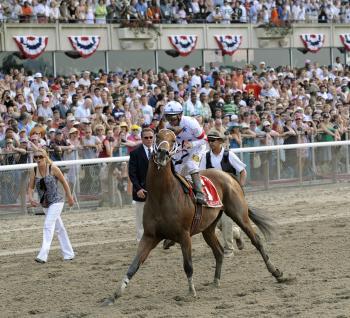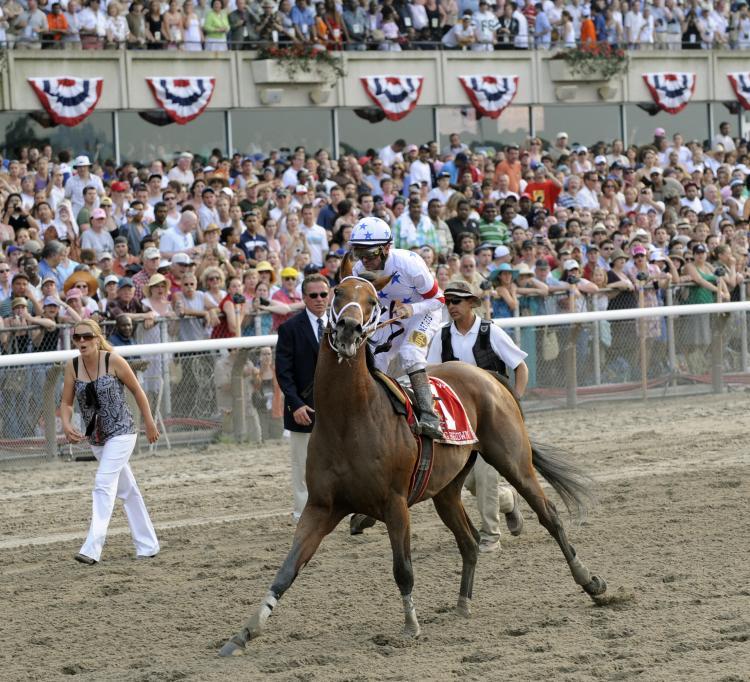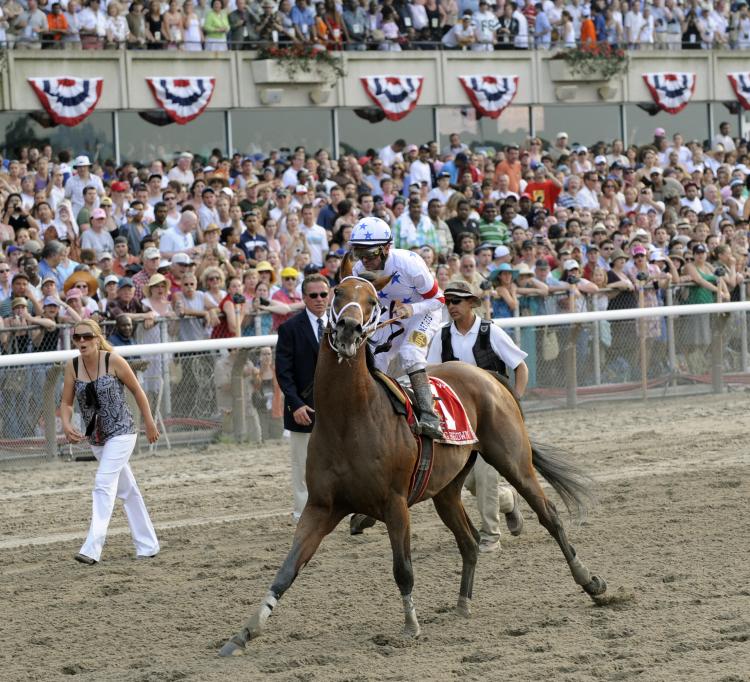In looking at the justification used by Big Brown’s trainer, Rick Dutrow, on giving his horses the steroid Winstrol, one wonders why he administered it and talked about it improving appetite.
The following are quotes on Winstrol for horses from a research report by Abbott Laboratories “Anabolic Therapy for Dogs and Cats and Horses”:
“Winstrol-V sterile suspension is recommended as an aid for treating debilitated horses when the therapeutic objective is to improve appetite, promote weight gain, improve general physical conditions, and accelerate recovery…the clinical condition most amenable to treatment are debilitated states resulting from illness, surgery, traumatic injuries, or plain overwork. In clinical investigations, administration of Winstrol-V frequently had a marked effect on horses exhibiting diminished vitality and vigor due to over exertion.”
A quote from the same report for contraindications:
“In the absence of data on the effect of Winstrol-V, sterile suspension on stallions and pregnant mares or the teratogenicity (embryo birth defects) on offspring, Winstrol-V should not be used in these animals.” Teratogenicity is the long-term effects gathered from research on offspring.
What situation mentioned in the recommended use above covered Big Brown?
Following the Rules
There exist several forms of equine sports in the world with each having
a governing body. The responsibility of these governing bodies is to establish the infrastructure for the sport, including all rulings on abuse and drug use, and the prohibition and penalties thereof.
In researching the inadequacy of the reasons given for administering drugs, I looked to the rules of the governing body of a very strenuous riding discipline, United States Combined Training, also known as three-day eventing.
This riding discipline evolved from the tests of discipline and endurance that horses and their riders where put through to specially prepare them for the military.
The levels of fitness required and the stresses endured by the three-day event horse far surpass that of a racehorse. Addressing only a symptom rather than a cause, or masking a symptom, can spell disaster in eventing. The sport goes on with its testing of horse and rider for three days, in various disciplines and over miles of endurance tests.
Yet, the rules governing the use of drugs are strict and enforced. There are two categories, from Chapter 4 of the 2007 United States Equestrian Rules for Eventing—“No Foreign Substances and Therapeutic Foreign Substances.” The testing is rigorous.
The penalties for violation range from a short suspension to indefinite suspension and fines. These rules were designed to promote fairness and optimum performance based on conditioning and soundness.
Regular steroid use was accepted as routine in the case of Big Brown. Yet medical research seems to say differently. Why is the use of drugs permitted routinely for horses that race? The single factor that appears to stand out as a possibility is quick financial gain.
European Standards
The following is part of the statement “British Horseracing Authority Clarifies Policy on the Use of Performance Enhancing Drugs in Horses” released on Monday:
“From January 2009 horses trained overseas must be declared as not been trained on non-therapeutic substances. This will clarify that all overseas runners are subject to the rules already in place for European-trained horses.”
Europe and Great Britain have taken a stance against running on routine drugs. Many outstanding racehorses have shown that not using drugs is valid and possibly in the long run more humane, honest, and better for future generations of thoroughbred horses.
Race fans often love the beauty of the horses as much as the racing. Can a sport that has increasing fatalities really draw the crowds it once did? Although Rick Dutrow started a furor with his talking about routine use of drugs in his horses, this has only exposed an ongoing problem in the racing sport. Perhaps the already existing standard in Europe is something we should adopt.
As far as Big Brown goes, he is reported to be working well at Aqueduct Park. He has been invited to race in the prestigious Haskell Invitational at Monmouth Park on August 3.
The following are quotes on Winstrol for horses from a research report by Abbott Laboratories “Anabolic Therapy for Dogs and Cats and Horses”:
“Winstrol-V sterile suspension is recommended as an aid for treating debilitated horses when the therapeutic objective is to improve appetite, promote weight gain, improve general physical conditions, and accelerate recovery…the clinical condition most amenable to treatment are debilitated states resulting from illness, surgery, traumatic injuries, or plain overwork. In clinical investigations, administration of Winstrol-V frequently had a marked effect on horses exhibiting diminished vitality and vigor due to over exertion.”
A quote from the same report for contraindications:
“In the absence of data on the effect of Winstrol-V, sterile suspension on stallions and pregnant mares or the teratogenicity (embryo birth defects) on offspring, Winstrol-V should not be used in these animals.” Teratogenicity is the long-term effects gathered from research on offspring.
What situation mentioned in the recommended use above covered Big Brown?
Following the Rules
There exist several forms of equine sports in the world with each having
a governing body. The responsibility of these governing bodies is to establish the infrastructure for the sport, including all rulings on abuse and drug use, and the prohibition and penalties thereof.
In researching the inadequacy of the reasons given for administering drugs, I looked to the rules of the governing body of a very strenuous riding discipline, United States Combined Training, also known as three-day eventing.
This riding discipline evolved from the tests of discipline and endurance that horses and their riders where put through to specially prepare them for the military.
The levels of fitness required and the stresses endured by the three-day event horse far surpass that of a racehorse. Addressing only a symptom rather than a cause, or masking a symptom, can spell disaster in eventing. The sport goes on with its testing of horse and rider for three days, in various disciplines and over miles of endurance tests.
Yet, the rules governing the use of drugs are strict and enforced. There are two categories, from Chapter 4 of the 2007 United States Equestrian Rules for Eventing—“No Foreign Substances and Therapeutic Foreign Substances.” The testing is rigorous.
The penalties for violation range from a short suspension to indefinite suspension and fines. These rules were designed to promote fairness and optimum performance based on conditioning and soundness.
Regular steroid use was accepted as routine in the case of Big Brown. Yet medical research seems to say differently. Why is the use of drugs permitted routinely for horses that race? The single factor that appears to stand out as a possibility is quick financial gain.
European Standards
The following is part of the statement “British Horseracing Authority Clarifies Policy on the Use of Performance Enhancing Drugs in Horses” released on Monday:
“From January 2009 horses trained overseas must be declared as not been trained on non-therapeutic substances. This will clarify that all overseas runners are subject to the rules already in place for European-trained horses.”
Europe and Great Britain have taken a stance against running on routine drugs. Many outstanding racehorses have shown that not using drugs is valid and possibly in the long run more humane, honest, and better for future generations of thoroughbred horses.
Race fans often love the beauty of the horses as much as the racing. Can a sport that has increasing fatalities really draw the crowds it once did? Although Rick Dutrow started a furor with his talking about routine use of drugs in his horses, this has only exposed an ongoing problem in the racing sport. Perhaps the already existing standard in Europe is something we should adopt.
As far as Big Brown goes, he is reported to be working well at Aqueduct Park. He has been invited to race in the prestigious Haskell Invitational at Monmouth Park on August 3.






